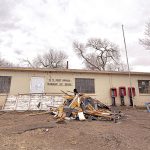
Leaders urged to ‘do their job,’ allocate ARPA money
WINDOW ROCK

Navajo Times | Donovan Quintero
Protestors carry signs showing their opposition against helium development on Monday in Window Rock.
With $1.07 billion in American Rescue Plan Act funds idle because the Navajo Nation Council and president’s office are divided over how to spend it, members of the Dzil Yijiin Regional Council marched on the first day of spring session Monday to express concern.
Marcus Tulley, president of the regional council, said the protest was to demand Navajo Nation leaders to “do their job” and approve ARPA spending.
“The people that are suffering are the chapter people,” said Tulley. “They need to stop playing games with these funds and sit down together and iron things out.”
The Dzil Yijiin region includes Hardrock, Black Mesa, Forest Lake, Pinon, Whippoorwill, Blue Gap and Low Mountain chapters.
Tulley said the ARPA recovery money was not allocated to the president’s office nor Council.
“It was allocated to the Navajo Nation people,” he said. “We need to spend these funds before they revert back. We could have already begun construction on a lot of these projects.”
Tulley said chapters have numerous infrastructure and economic needs that could be addressed with ARPA funds and communities are very concerned the prolonged inaction by the Council will jeopardize vital projects.
“That’s what we’re advocating for is we need projects funded and started,” he said. “These guys have been playing around with this for a long time, but now it’s time for accountability. We’re just having a peaceful march to bring to light that enough is enough.”
‘We’ve been ready’
Tulley, who is also president of Blue Gap Chapter, said both the legislative and executive branches have done “anything and everything,” to delay the ARPA project spending process while chapters have been prepared to start projects since funds were received last spring.
“We’ve been ready – they told us to jump and we jumped,” he said.
By June 2021, the 110 chapters had submitted a total of 550 project applications for a total of $1.1 billion to the Division of Community Development.
“We’re just waiting on our leadership to decide on projects,” said Tulley. “We want the Navajo Nation Council and the Office of the President to work together in the spirit of K’e and work things out.”
Now that one spending bill (No. 257-21) was nullified, chapter projects are once again hanging in the balance, said Mae-Gilene Begay, regional council vice president and president of Forest Lake Chapter, who also participated in the march.
“We were told to submit chapter or community projects over a year ago,” said Begay. “We complied. After that we just waited. We grew frustrated.”
Meanwhile, the states and counties are already implementing projects, said Begay.
“We’re really concerned that nothing is happening,” she said. “With the red tape, we know it’s going to be difficult to get those dollars to implement projects within our area.”
Tulley said Navajo Nation chapters are finally waking up and holding their leadership accountable.
“Too many work sessions didn’t resolve anything,” he said. “No more behind-closed-doors meetings but bring everything to the table and be transparent.”
‘Political football’
When they arrived at the Navajo Nation Council Chamber, Tulley said they met with Speaker Seth Damon and explained to him the urgency of fixing the ARPA funds.
They also tried to meet with President Jonathan Nez, but he was not in his office, he said.
“The speaker came out and spoke to us and we let him know we’re very concerned about the very slow progress in getting the ARPA funds moving,” said Begay.
Damon told them he was working on a compromise with the president’s office.
“We told speaker, you guys are elected officials and you took the oath of office to make things better for your constituents, to uphold the integrity and protect and help the Navajo Nation people, not to play interoffice politics,” said Tulley.
Begay said they’ve been telling their delegates to stop being cocky with each other.
“You need to be respectful, be humble and come to a good solution that will benefit the Nation,” she said. “We’re also upset with the president and the vice president because they should have put their foot down and said this is enough, we want everything done by this date.”
It’s time to stop fighting about the projects, focus on solutions and get to work, said Tulley.
“We have people who are actually suffering,” he said.
“We had hoped that this money would at least make some improvements with the ARPA funds, but here we are still talking about how we’re going to spend the money and who’s going to have control over it,” said Tulley. “It’s become a political football.”
‘Projects tied up’
Tulley said many of the people in his region live on dirt floors, travel dirt roads, use outhouses and have no running water or electricity, which has made them more vulnerable to COVID-19 and its impacts.
“You can still see a lot of people living in hogans,” he said.
He said there is also a great deal of hardship being experienced by the people in the Dzil Yijiin region who live on Navajo Partitioned Land.
“My gosh, how can you not see the need there? How can you not address it?” he asked. “These families, I really feel for them. They get hit by the U.S. government and our government as well.”
He said NPL residents are at extreme disadvantage because the federal government previously put a moratorium on development and improvements.
“We have a lot of needs at the chapter level and individual homes,” said Tulley. “I don’t know why the Council and the office of the president are debating.”
Begay said there are pieces like rural addressing and broadband that could be implemented right away that are being delayed because of the political turmoil.
“Those are projects could easily move forward, but all the projects are being tied up,” she said.
Tulley said the $745,000 per chapter that is now being proposed by President Nez in a newly proposed ARPA legislation is simply not enough.
“Nowadays, you really can’t build anything for less than one million dollars,” he said. “That’s not going to even take care of one project.”
Blue Gap and Forest Lake alone submitted $15 million and $26 million in proposed ARPA chapter projects, respectively, with no action to date.








 Highway 264,
Highway 264, I-40, WB @ Winslow
I-40, WB @ Winslow